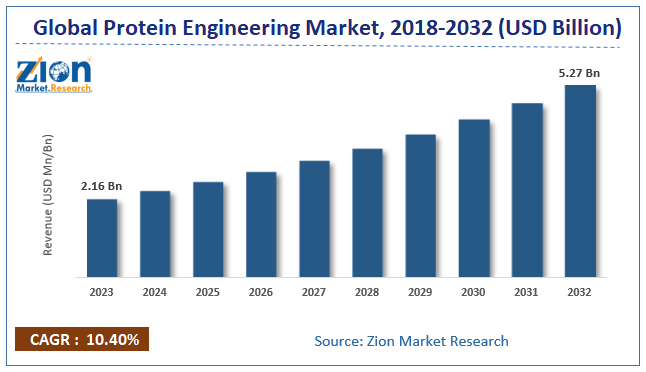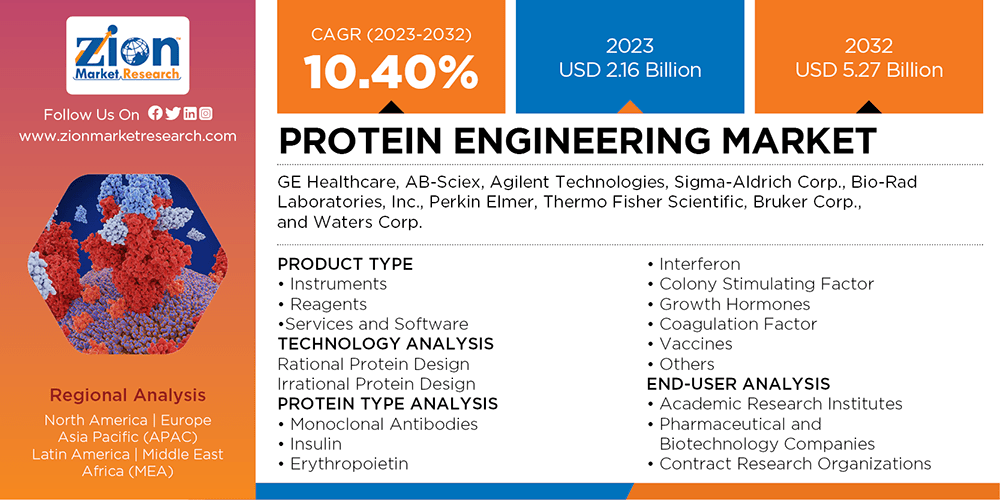Protein Engineering Market Size, Share, Trends, Growth 2032

Protein Engineering Market By Product Type (Instruments, Reagents, and Services & Software), By Technology (Rational Protein Design and Irrational Protein Design), By Protein Type (Monoclonal Antibodies, Insulin, Erythropoietin, Interferon, Colony Stimulating Factor, Growth Hormones, Coagulation Factor, Vaccines, and Others), and By End-User (Academic Research Institutes, Pharmaceutical & Biotechnology Companies, and Contract Research Organizations)And By Region - Global And Regional Industry Overview, Market Intelligence, Comprehensive Analysis, Historical Data, And Forecasts 2024 - 2032-
| Market Size in 2023 | Market Forecast in 2032 | CAGR (in %) | Base Year |
|---|---|---|---|
| USD 2.16 Billion | USD 5.27 Billion | 10.40% | 2023 |
Protein Engineering Industry Prospective:
The global protein engineering market size was worth around USD 2.16 billion in 2023 and is predicted to grow to around USD 5.27 billion by 2032 with a compound annual growth rate (CAGR) of roughly 10.40% between 2024 and 2032.
The report covers a forecast and an analysis of the protein engineering market on a global and regional level. The study provides historical data for 2020, 2021, and 2022 along with a forecast from 2024 to 2032 based on revenue (USD Billion). The study includes drivers and restraints for the protein engineering market along with the impact they have on the demand over the forecast period. Additionally, the report includes the study of opportunities available in the protein engineering market on a global level.
Protein Engineering Market: Growth Drivers
Protein engineering is the method for developing novel, valuable, and beneficial proteins. Many different protein engineering methods are available today, owing to the rapid development in biological sciences, particularly the recombinant DNA technology. Protein engineering can be performed with two major techniques—rational protein designing and directed evaluation. Proteins have high specificity and less immunogenicity. Proteins can be modified in various ways to be used as therapeutic agents. By using protein engineering technique, unnatural proteins can be utilized for valuable clinical research.
Developing pharmaceutical industries, biotechnological innovations, increasing focus toward targeting specific drug development, rising clinical and analytical techniques, and a substantial increase in research funding are primary factors likely to drive the global protein engineering market over the forecast time period. Furthermore, the increasing adoption of protein drugs over non-protein drugs, owing to their potential benefits with targeted effects, is anticipated to further boost this market’s growth over the estimated time period.
Moreover, the rising prevalence of protein-deficient diseases and increasing demand for alternatives to chemical processes are also projected to propel the protein engineering market in the upcoming years.
In order to give the users of this report a comprehensive view of the protein engineering market, we have included competitive landscape and analysis of Porter’s Five Forces model for the market. The study encompasses a market attractiveness analysis, wherein all the segments are benchmarked based on their market size, growth rate, and general attractiveness.
The report provides company market share analysis to give a broader overview of the key players in the market. In addition, the report also covers key strategic developments of the market including acquisitions & mergers, new product launch, agreements, partnerships, collaborations & joint ventures, research & development, and regional expansion of the major participants involved in the market on a global and regional basis. Moreover, the study covers the price trend analysis and application portfolio of various companies according to regions.
Protein Engineering Market : Report Scope
| Report Attributes | Report Details |
|---|---|
| Report Name | Protein Engineering Market Research Report |
| Market Size in 2023 | USD 2.16 Billion |
| Market Forecast in 2032 | USD 5.27 Billion |
| Growth Rate | CAGR of 10.40% |
| Number of Pages | 215 |
| Key Companies Covered | GE Healthcare, AB-Sciex, Agilent Technologies, Sigma-Aldrich Corp., Bio-Rad Laboratories, Inc., Perkin Elmer, Thermo Fisher Scientific, Bruker Corp., and Waters Corp |
| Segments Covered | By Product Type, By Technology, By Protein Type, End-User and By Region |
| Regions Covered | North America, Europe, Asia Pacific (APAC), Latin America, Middle East, and Africa (MEA) |
| Base Year | 2023 |
| Historical Year | 2018 to 2022 |
| Forecast Year | 2024 - 2032 |
| Customization Scope | Avail customized purchase options to meet your exact research needs. Request For Customization |
Protein Engineering Market: Segmentation
The study provides a decisive view of the protein engineering market by segmenting it based on product type, technology, protein type, end-user, and region.
By product type, the market is segmented into instruments, reagents, and services and software.
Based on technology, the global protein engineering market is segmented into rational protein design and irrational protein design.
The protein type segment, of the global protein engineering market is segmented into monoclonal antibodies, insulin, erythropoietin, interferon, colony stimulating factor, growth hormones, a coagulation factor, vaccines, and others.
Academic research institutes, pharmaceutical, and biotechnology companies, and contract research organizations comprise the end-user segment of the global protein engineering market.
Protein Engineering Market: Regional Analysis
The regional segment of the protein engineering market includes the current and forecast demand for North America, Europe, Asia Pacific, Latin America, and the Middle East and Africa with its further segmentation into major countries including the U.S., UK, Germany, France, Italy, Spain, China, Japan, India, Brazil, etc.
By region, North America held a dominant share of the global protein engineering market in 2018 and is anticipated to continue its regional domination over the forecast years as well. This regional growth can be attributed to the robust healthcare infrastructure, extensive commercialization of advanced engineering tools, high adoption of protein-based drugs, and huge investments in drug development. The Asia Pacific region is anticipated to grow significantly in the upcoming years, owing to the increased government support, the rising prevalence of protein deficiency diseases, and high unmet medical needs in the region.
Protein Engineering Market: Competitive Analysis
The global protein engineering market is dominated by players like:
- GE Healthcare
- AB-Sciex
- Agilent Technologies
- Sigma-Aldrich Corp
- Bio-Rad Laboratories, Inc
- Perkin Elmer
- Thermo Fisher Scientific
- Bruker Corp
- Waters Corp
This report segments the global protein engineering market into:
Global Protein Engineering Market: Product Type Analysis
- Instruments
- Reagents
- Services and Software
Global Protein Engineering Market: Technology Analysis
- Rational Protein Design
- Irrational Protein Design
Global Protein Engineering Market: Protein Type Analysis
- Monoclonal Antibodies
- Insulin
- Erythropoietin
- Interferon
- Colony Stimulating Factor
- Growth Hormones
- Coagulation Factor
- Vaccines
- Others
Global Protein Engineering Market: End-User Analysis
- Academic Research Institutes
- Pharmaceutical and Biotechnology Companies
- Contract Research Organizations
Global Protein Engineering Market: Regional Analysis
- North America
- The U.S.
- Europe
- UK
- France
- Germany
- Asia Pacific
- China
- Japan
- India
- Latin America
- Brazil
- Middle East and Africa
Table Of Content
Methodology
FrequentlyAsked Questions
Protein engineering is a multidisciplinary domain encompassing the conceptualization, fabrication, and alteration of proteins to impart specific characteristics. By integrating principles derived from molecular biology, biochemistry, genetics, and other pertinent fields, this technique manipulates proteins to achieve a multitude of objectives, including but not limited to enhancing their stability, activity, specificity, or even generating novel functionalities.
The increasing incidence of chronic illnesses and the expanding market for personalized medicine are factors that are propelling the demand for innovative biopharmaceuticals. The field of protein engineering facilitates the conceptualization and refinement of therapeutic proteins, thereby contributing to the creation of more potent and precise treatments.
The global protein engineering market size was worth around USD 2.16 billion in 2023 and is predicted to grow to around USD 5.27 billion by 2032.
The global protein engineering market with a compound annual growth rate (CAGR) of roughly 10.40% between 2024 and 2032.
The regional segment of the protein engineering market includes the current and forecast demand for North America, Europe, Asia Pacific, Latin America, and the Middle East and Africa with its further segmentation into major countries including the U.S., UK, Germany, France, Italy, Spain, China, Japan, India, Brazil, etc.
Some key players of the global protein engineering market are GE Healthcare, AB-Sciex, Agilent Technologies, Sigma-Aldrich Corp., Bio-Rad Laboratories, Inc., Perkin Elmer, Thermo Fisher Scientific, Bruker Corp., and Waters Corp., among others.
RelatedNews
HappyClients
Zion Market Research
Tel: +1 (302) 444-0166
USA/Canada Toll Free No.+1 (855) 465-4651
3rd Floor,
Mrunal Paradise, Opp Maharaja Hotel,
Pimple Gurav, Pune 411061,
Maharashtra, India
Phone No +91 7768 006 007, +91 7768 006 008
US OFFICE NO +1 (302) 444-0166
US/CAN TOLL FREE +1 (855) 465-4651
Email: sales@zionmarketresearch.com
We have secured system to process your transaction.
Our support available to help you 24 hours a day, five days a week.
Monday - Friday: 9AM - 6PM
Saturday - Sunday: Closed







